外研版八年级英语上册课件 Module 11 Way of life Unit 1 (共42张PPT)
文档属性
| 名称 | 外研版八年级英语上册课件 Module 11 Way of life Unit 1 (共42张PPT) |
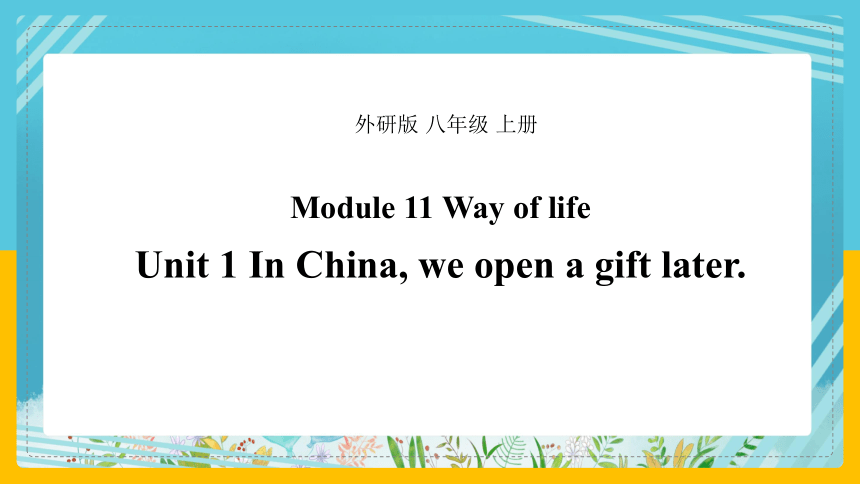
|
|
| 格式 | ppt | ||
| 文件大小 | 2.6MB | ||
| 资源类型 | 教案 | ||
| 版本资源 | 外研版 | ||
| 科目 | 英语 | ||
| 更新时间 | 2022-08-03 00:00:00 | ||
图片预览

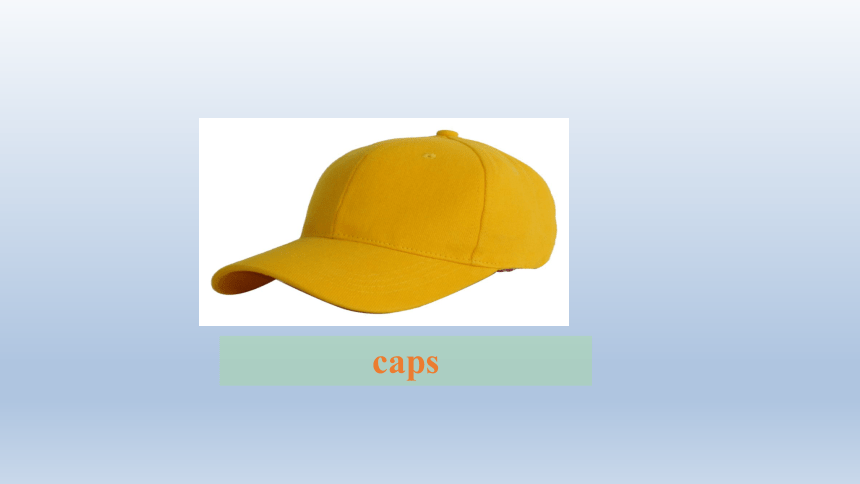
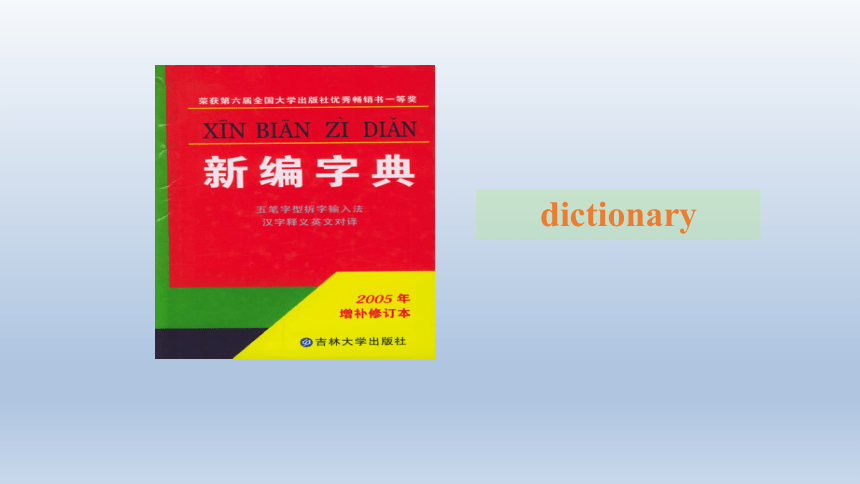
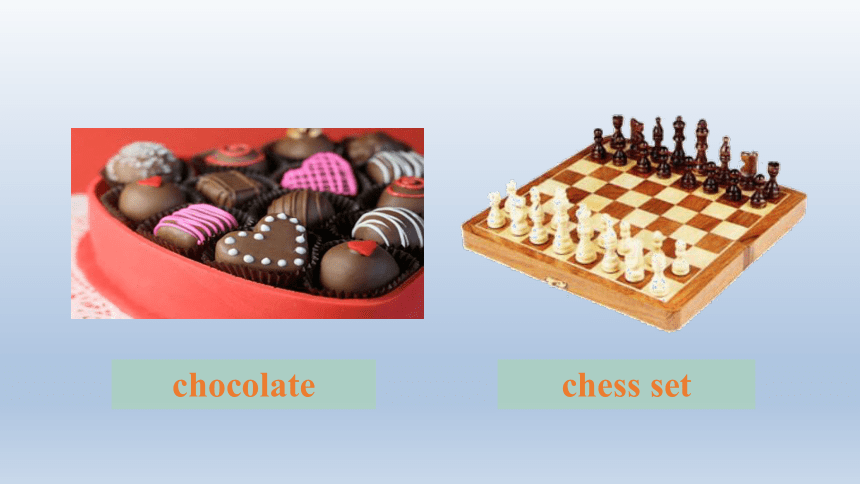
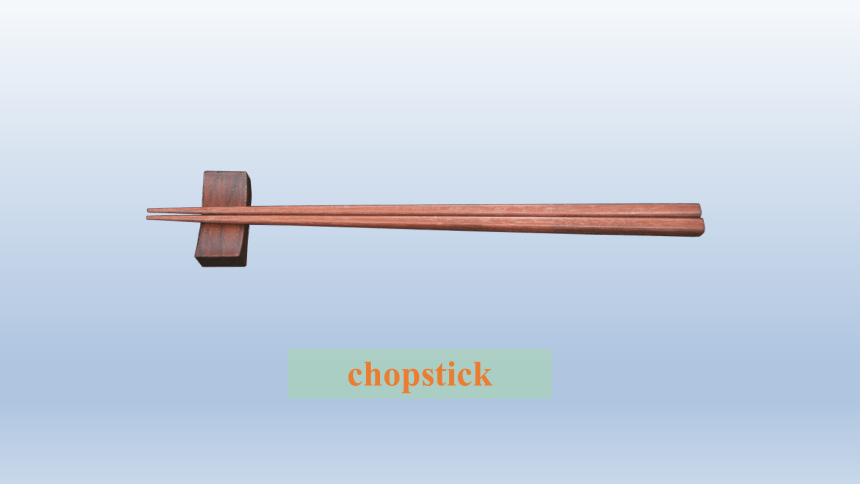
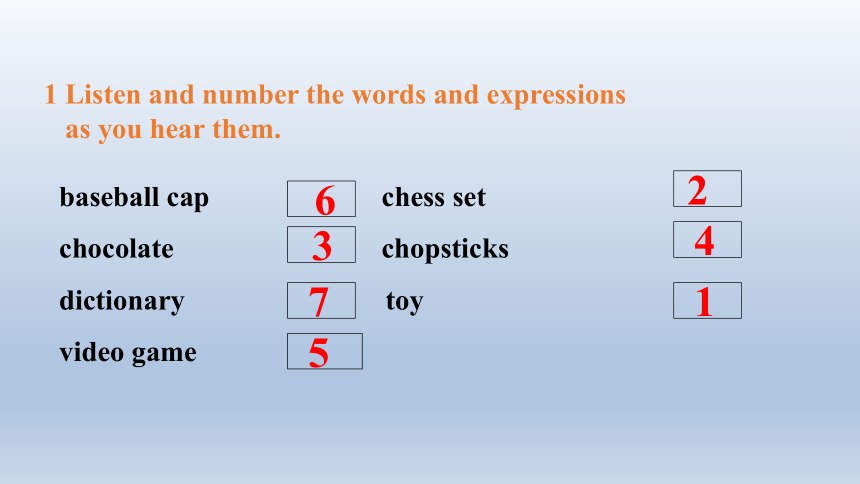
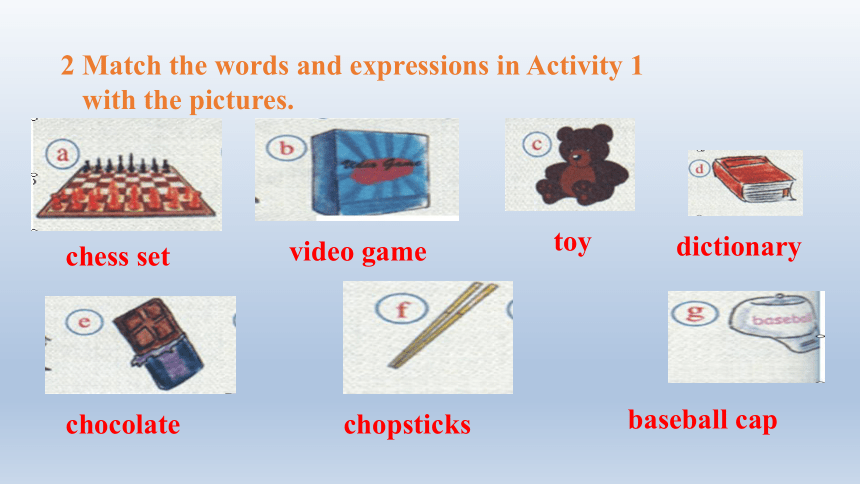
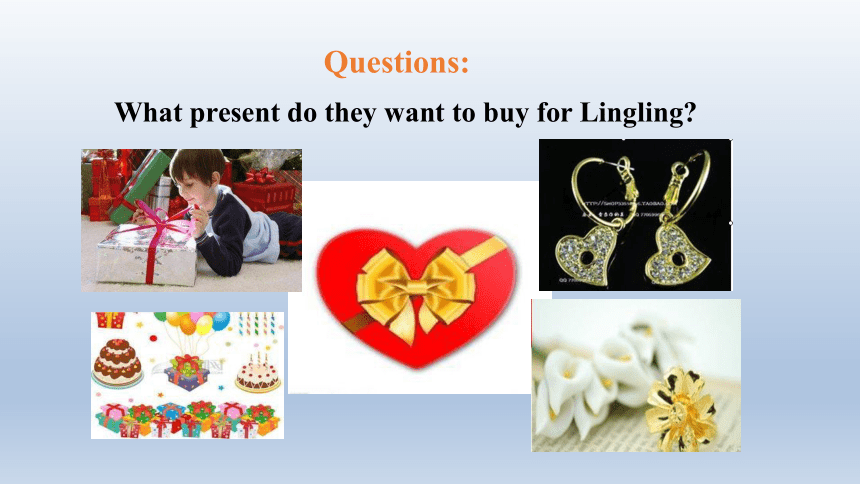
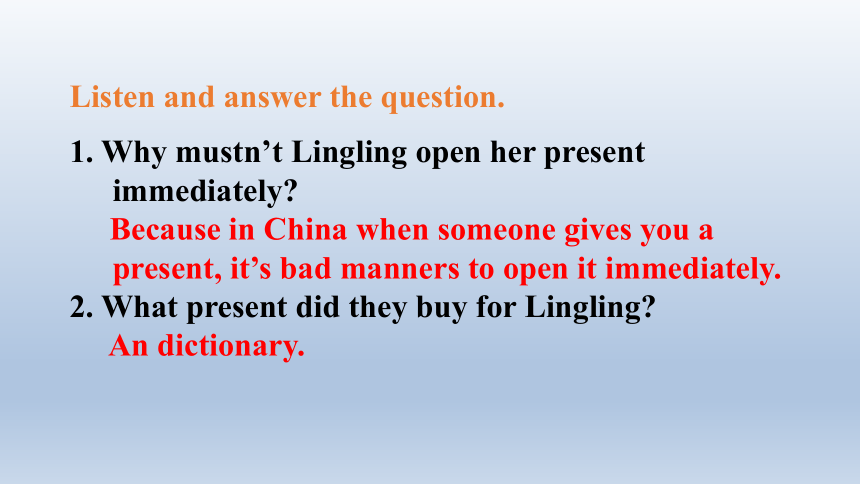


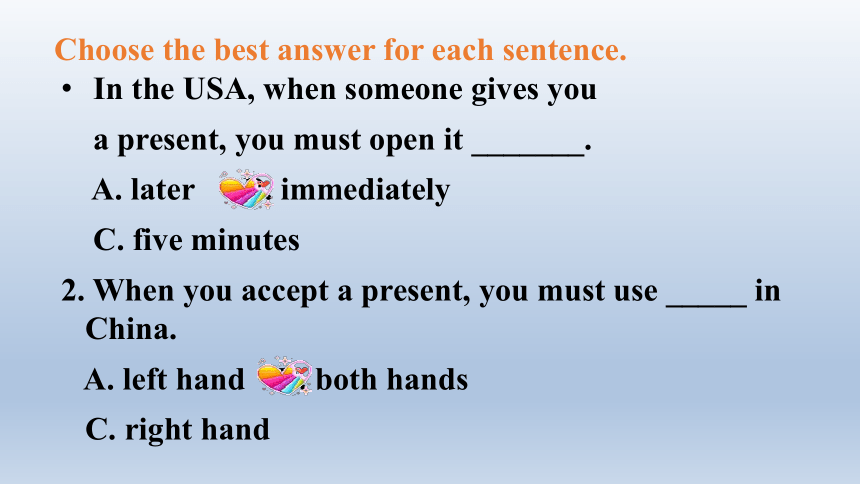
文档简介
(共42张PPT)
外研版 八年级 上册
Module 11 Way of life
Unit 1 In China, we open a gift later.
caps
dictionary
chocolate
chess set
chopstick
1 Listen and number the words and expressions
as you hear them.
baseball cap chess set
chocolate chopsticks
dictionary toy
video game
6
2
3
7
5
4
1
2 Match the words and expressions in Activity 1
with the pictures.
chess set
toy
baseball cap
video game
dictionary
chocolate
chopsticks
Questions:
What present do they want to buy for Lingling
Listen and answer the question.
1. Why mustn’t Lingling open her present immediately
Because in China when someone gives you a present, it’s bad manners to open it immediately.
2. What present did they buy for Lingling
An dictionary.
Now check (√) what you usually do in China.
1 Open a present immediately when you receive it.
2 Accept a present with both hands.
3 Use red paper for hongbao.
4 Do cleaning on the first day of the Spring Festival.
5 Cut your hair during the Spring Festival.
6 Break something during the Spring Festival.
√
√
4 Complete the passage with the words in the box.
It is always a(n)(1) to receive gifts from
family members and friends. In China, we usually
(2) a gift with both hands and open it later.
But in the west, people usually do not pay much
(3) to that. During the Spring Festival, there
are many (4) . For example, people in the
north of China eat lots of jiaozi. They (5) great.
accept attention surprise taste traditions
traditions
surprise
accept
attention
taste
Choose the best answer for each sentence.
In the USA, when someone gives you
a present, you must open it _______.
A. later B. immediately
C. five minutes
2. When you accept a present, you must use _____ in China.
A. left hand B. both hands
C. right hand
3. When you accept a present, you can use
_____ in Britain.
A. both hands B. one hand C. a box
4. Hongbao in ____ paper is lucky.
A. white B. green C. red
5. You mustn’t do any ______ on the first
day of the Spring Festival.
A. shopping B. cleaning C. cooking
Read the passage and find out the sentences with can, can’t, must, mustn’t. And try to understand their meanings.
Speaking
5 Read and predict how the speaker will
pronounce the underlined words.
1 I don’t think I open it now.
2 You wait.
3 You break anything.
4 You only use red paper for hongbao.
5 cut your hair during the Spring
Festival month.
Now listen and check.
should
needn’t
mustn’t
must
You’d better not
6 Read the sentences in Activity 5 aloud.
7 Think about what you must and mustn’t /
can’t do in the situations. Write notes.
Must Mustn't/ can’t
At school Put up your hand before you talk
At the dining table talk with food in your mouth
Now work in pairs. Say what you mustn't/ can’t do.
You _____ ______ the table.
×
√
You _______ _____ the bowls
when you are jumping.
clean
wash
must
mustn’t
用 must, mustn’t和can’t 完成句子。
You _____ ____ your clothes on Sunday.
wash
You _______ ____ the guitar every evening.
play
×
√
must
mustn’t
You _______ _____ the garden so dirty.
make
You _____ ____ your mother keep the garden beautiful.
help
×
√
must
mustn’t
You _____ _____ the floor with a towel (毛巾).
You ____ _____ the floor with _____ (拖把).
clean
clean
a mop
must
can’t
Grammar Focus
情态动词
must, can need等
(能)
(最好…)
(需要)
(必须)
(不得不)
情态动词后面 + 动词原形
情态动词没有人称和数的变化
I can not play basketball.
I need buy / bought a computer.
She can / cans ride a horse.
Amy need / needs buy a book.
否定式构成是在情态动词后面加 "not"
I can play / played basketball.
(能)
用法:
① 表示能力 :
He can speak a little English.
Can you fly
③ 表示请求或允许 :
Can I help you
② 表示猜测 :
That can not be our English teacher,
because she has gone to Shanghai .
could也可表示请求,语气委婉,主要用于疑问句,不可用于肯定句,答语应用can
Could I come to see you tomorrow
Yes, you can. (否定答语可用No, I'm afraid not.)
用法:
①表示请求或允许 :
May I go home,please
(1)以may(表许可或请求)开头的一般疑问句,肯定回答用may,否定回答用mustn't或can't. (2)在疑问句中不用于第二人称
② 表示可能性 :
You may be right.
No, you _________
(可以)
Yes, you may.
might为may的过去式,但也可以代替may,语气较为婉转客气或更加不肯定。
You might be right.
mustn’t / you can’t.
试比较 :
● You may not smoke here.(不可以) 语气轻
● You can’t smoke here.(不能)重
● You mustn’t smoke here.(决不可)最重
用法:
既可以做情态动词, 也可以做实意动词
② 实意动词 (need to do sth) :
① 情态动词 (need do sth)
I need buy a big house.
(需要)
He need drive me home.
Do I need to buy a big house
He needs to buy a big house.
Need I buy a big house
-- Yes, you must.
-- No, you needn’t / don’t have to. (不必要)
-- Yes, you do. /-- No, you don’t.
need
用法:
② 表示推测“肯定,一定” :
① 表示义务、必要或命令 :
You must come early tomorrow.
---Must I finish my homework first
They must be at home. The light is on.
--- Yes, you must.
--- No, you don't have to/ needn't.
(必须)
must开头的疑问句,其否定回答通常用 don‘t have to 或needn’t 。而不用mustn't
(禁止)
③ 否定时表示 “禁止” :
You mustn’t smoke here.
It’s eleven o’clock . I have to go now .
It was getting dark. He had to finish the work first .
I don’t have to go now .
He doesn’t have to finish the work first.
(必须)
have to 表示客观因素
We are very glad at the party , but it’s 11 , so we have to leave now .
must 表示主观因素
We must study hard to find a good job for ourselves .
(必须)
My brother was very ill, so I call the
doctor in the middle of the night.
He said that they work hard.
You don't have to tell him about it.
You mustn't tell him about it.
你不一定要把此事告诉他。
你一定不要把这件事告诉他 .
had to
must
had better意为“最好”,表示建议和劝告,
简略式为‘d better,否定式为had better not,
后面跟动词原形。
You had better go to see a doctor.
You’d better not stay here.
(最好)
Exercises
一、单项填空。
1. You have already tried your best, so
you ___ worry about the matter.
A. needn’t B. mustn’t
2. Usually he writes ___ ink and___ his
left hand.
A. in; by B. in; with
3. It’s ___.
A. a bad luck B. bad luck
4. -Can you play with a yo-yo, Jim
-Yes, I ___. It’s easy.
A. must B. can
5. -What did the head teacher say at
the meeting
-He said, “ We ___ be proud of working
hard. We mustn’t be lazy.”
A. must B. needn’t
6. You are very ill, so you ___ stay in bed
for a week.
A. need B. must
二、根据句意及首字母提示,写出相应的单词。
1. My brother is c______ happily with his friends by QQ.
2. — Can you help me h___ up the picture, Jack
— No problem.
3. Jane came to see me i__________ after she arrived in Beijing.
4. Our English teacher can’t a_____ our invitation, because
he is too busy.
5. — I passed the final exam yesterday.
— Wow, you are really a l____ dog.
hatting
ang
mmediately
ccept
ucky
三、根据汉语提示完成下列句子,每空一词。
1. 稍等一会儿, 我马上回来。
_____ __ a minute. I’m just coming.
2. —现在正在下大雨。我们只能呆在家里。
—倒霉。
—It’s raining heavily. We have to stay at home.
— It’s ___ ____.
3. 看!他的爸爸和妈妈来了。
Look! ____ _____ his father and mother.
4. 这仅仅是一个故事。你们不应当这么严肃吧!
This is only a story. You can’t __ ______!
5. 快点,否则你会错过末班车的。
___ _ _____ __, or you’ll miss the last bus.
Hang on
bad luck
Here come
be serious
Get a move on
1. — Could I borrow your dictionary
— Yes, of course you _______.
A. might B. will C. can D. should
2. You ______ return the book now. You can
keep it till next week if you like.
A. can’t B. mustn’t C. needn’t D. may not
C
C
四、单选
3. Johnny, you ______ play with the knife, you
______ hurt yourself.
A. won’t ; can’t B. mustn’t ; may
C. shouldn’t ; must D. can’t ; shouldn’t
B
4. --Will you stay for lunch
--Sorry, _____. My brother is coming to see me.
A. I mustn’t B. I can’t
C. I needn’t D. I won’t
5. --May I pick a flower in the garden
-- ________.
A. No, you needn’t B. Not, please.
C. No, you mustn’t D. No, you won’t
B
C
6. "Must I drive to his house and pick up the
children "
"No, ." A. you shouldn't B. you might not
C. you needn't D. you mustn't
C
7. There is someone knocking at the door, it be Tom A. can B. must C. should D. ought to
A
Homework
Try to make friends with foreigners and try to
communicate with him or her about their culture.
Try to master the main grammar this unit
required.
外研版 八年级 上册
Module 11 Way of life
Unit 1 In China, we open a gift later.
caps
dictionary
chocolate
chess set
chopstick
1 Listen and number the words and expressions
as you hear them.
baseball cap chess set
chocolate chopsticks
dictionary toy
video game
6
2
3
7
5
4
1
2 Match the words and expressions in Activity 1
with the pictures.
chess set
toy
baseball cap
video game
dictionary
chocolate
chopsticks
Questions:
What present do they want to buy for Lingling
Listen and answer the question.
1. Why mustn’t Lingling open her present immediately
Because in China when someone gives you a present, it’s bad manners to open it immediately.
2. What present did they buy for Lingling
An dictionary.
Now check (√) what you usually do in China.
1 Open a present immediately when you receive it.
2 Accept a present with both hands.
3 Use red paper for hongbao.
4 Do cleaning on the first day of the Spring Festival.
5 Cut your hair during the Spring Festival.
6 Break something during the Spring Festival.
√
√
4 Complete the passage with the words in the box.
It is always a(n)(1) to receive gifts from
family members and friends. In China, we usually
(2) a gift with both hands and open it later.
But in the west, people usually do not pay much
(3) to that. During the Spring Festival, there
are many (4) . For example, people in the
north of China eat lots of jiaozi. They (5) great.
accept attention surprise taste traditions
traditions
surprise
accept
attention
taste
Choose the best answer for each sentence.
In the USA, when someone gives you
a present, you must open it _______.
A. later B. immediately
C. five minutes
2. When you accept a present, you must use _____ in China.
A. left hand B. both hands
C. right hand
3. When you accept a present, you can use
_____ in Britain.
A. both hands B. one hand C. a box
4. Hongbao in ____ paper is lucky.
A. white B. green C. red
5. You mustn’t do any ______ on the first
day of the Spring Festival.
A. shopping B. cleaning C. cooking
Read the passage and find out the sentences with can, can’t, must, mustn’t. And try to understand their meanings.
Speaking
5 Read and predict how the speaker will
pronounce the underlined words.
1 I don’t think I open it now.
2 You wait.
3 You break anything.
4 You only use red paper for hongbao.
5 cut your hair during the Spring
Festival month.
Now listen and check.
should
needn’t
mustn’t
must
You’d better not
6 Read the sentences in Activity 5 aloud.
7 Think about what you must and mustn’t /
can’t do in the situations. Write notes.
Must Mustn't/ can’t
At school Put up your hand before you talk
At the dining table talk with food in your mouth
Now work in pairs. Say what you mustn't/ can’t do.
You _____ ______ the table.
×
√
You _______ _____ the bowls
when you are jumping.
clean
wash
must
mustn’t
用 must, mustn’t和can’t 完成句子。
You _____ ____ your clothes on Sunday.
wash
You _______ ____ the guitar every evening.
play
×
√
must
mustn’t
You _______ _____ the garden so dirty.
make
You _____ ____ your mother keep the garden beautiful.
help
×
√
must
mustn’t
You _____ _____ the floor with a towel (毛巾).
You ____ _____ the floor with _____ (拖把).
clean
clean
a mop
must
can’t
Grammar Focus
情态动词
must, can need等
(能)
(最好…)
(需要)
(必须)
(不得不)
情态动词后面 + 动词原形
情态动词没有人称和数的变化
I can not play basketball.
I need buy / bought a computer.
She can / cans ride a horse.
Amy need / needs buy a book.
否定式构成是在情态动词后面加 "not"
I can play / played basketball.
(能)
用法:
① 表示能力 :
He can speak a little English.
Can you fly
③ 表示请求或允许 :
Can I help you
② 表示猜测 :
That can not be our English teacher,
because she has gone to Shanghai .
could也可表示请求,语气委婉,主要用于疑问句,不可用于肯定句,答语应用can
Could I come to see you tomorrow
Yes, you can. (否定答语可用No, I'm afraid not.)
用法:
①表示请求或允许 :
May I go home,please
(1)以may(表许可或请求)开头的一般疑问句,肯定回答用may,否定回答用mustn't或can't. (2)在疑问句中不用于第二人称
② 表示可能性 :
You may be right.
No, you _________
(可以)
Yes, you may.
might为may的过去式,但也可以代替may,语气较为婉转客气或更加不肯定。
You might be right.
mustn’t / you can’t.
试比较 :
● You may not smoke here.(不可以) 语气轻
● You can’t smoke here.(不能)重
● You mustn’t smoke here.(决不可)最重
用法:
既可以做情态动词, 也可以做实意动词
② 实意动词 (need to do sth) :
① 情态动词 (need do sth)
I need buy a big house.
(需要)
He need drive me home.
Do I need to buy a big house
He needs to buy a big house.
Need I buy a big house
-- Yes, you must.
-- No, you needn’t / don’t have to. (不必要)
-- Yes, you do. /-- No, you don’t.
need
用法:
② 表示推测“肯定,一定” :
① 表示义务、必要或命令 :
You must come early tomorrow.
---Must I finish my homework first
They must be at home. The light is on.
--- Yes, you must.
--- No, you don't have to/ needn't.
(必须)
must开头的疑问句,其否定回答通常用 don‘t have to 或needn’t 。而不用mustn't
(禁止)
③ 否定时表示 “禁止” :
You mustn’t smoke here.
It’s eleven o’clock . I have to go now .
It was getting dark. He had to finish the work first .
I don’t have to go now .
He doesn’t have to finish the work first.
(必须)
have to 表示客观因素
We are very glad at the party , but it’s 11 , so we have to leave now .
must 表示主观因素
We must study hard to find a good job for ourselves .
(必须)
My brother was very ill, so I call the
doctor in the middle of the night.
He said that they work hard.
You don't have to tell him about it.
You mustn't tell him about it.
你不一定要把此事告诉他。
你一定不要把这件事告诉他 .
had to
must
had better意为“最好”,表示建议和劝告,
简略式为‘d better,否定式为had better not,
后面跟动词原形。
You had better go to see a doctor.
You’d better not stay here.
(最好)
Exercises
一、单项填空。
1. You have already tried your best, so
you ___ worry about the matter.
A. needn’t B. mustn’t
2. Usually he writes ___ ink and___ his
left hand.
A. in; by B. in; with
3. It’s ___.
A. a bad luck B. bad luck
4. -Can you play with a yo-yo, Jim
-Yes, I ___. It’s easy.
A. must B. can
5. -What did the head teacher say at
the meeting
-He said, “ We ___ be proud of working
hard. We mustn’t be lazy.”
A. must B. needn’t
6. You are very ill, so you ___ stay in bed
for a week.
A. need B. must
二、根据句意及首字母提示,写出相应的单词。
1. My brother is c______ happily with his friends by QQ.
2. — Can you help me h___ up the picture, Jack
— No problem.
3. Jane came to see me i__________ after she arrived in Beijing.
4. Our English teacher can’t a_____ our invitation, because
he is too busy.
5. — I passed the final exam yesterday.
— Wow, you are really a l____ dog.
hatting
ang
mmediately
ccept
ucky
三、根据汉语提示完成下列句子,每空一词。
1. 稍等一会儿, 我马上回来。
_____ __ a minute. I’m just coming.
2. —现在正在下大雨。我们只能呆在家里。
—倒霉。
—It’s raining heavily. We have to stay at home.
— It’s ___ ____.
3. 看!他的爸爸和妈妈来了。
Look! ____ _____ his father and mother.
4. 这仅仅是一个故事。你们不应当这么严肃吧!
This is only a story. You can’t __ ______!
5. 快点,否则你会错过末班车的。
___ _ _____ __, or you’ll miss the last bus.
Hang on
bad luck
Here come
be serious
Get a move on
1. — Could I borrow your dictionary
— Yes, of course you _______.
A. might B. will C. can D. should
2. You ______ return the book now. You can
keep it till next week if you like.
A. can’t B. mustn’t C. needn’t D. may not
C
C
四、单选
3. Johnny, you ______ play with the knife, you
______ hurt yourself.
A. won’t ; can’t B. mustn’t ; may
C. shouldn’t ; must D. can’t ; shouldn’t
B
4. --Will you stay for lunch
--Sorry, _____. My brother is coming to see me.
A. I mustn’t B. I can’t
C. I needn’t D. I won’t
5. --May I pick a flower in the garden
-- ________.
A. No, you needn’t B. Not, please.
C. No, you mustn’t D. No, you won’t
B
C
6. "Must I drive to his house and pick up the
children "
"No, ." A. you shouldn't B. you might not
C. you needn't D. you mustn't
C
7. There is someone knocking at the door, it be Tom A. can B. must C. should D. ought to
A
Homework
Try to make friends with foreigners and try to
communicate with him or her about their culture.
Try to master the main grammar this unit
required.
同课章节目录
- Module 1 How to learn English
- Unit 1 Let's try to speak English as much as possi
- Unit 2 You should smile at her.
- Unit 3 Language in use .
- Module 2 My home town and my country
- Unit 1 It's taller than many other buildings.
- Unit 2 Cambridge is a beautiful city in the east o
- Unit 3 Language in use .
- Module 3 Sports.
- Unit 1 Nothing is more exciting than playing tenni
- Unit 2 This year we training more carefully.
- Unit 3 Language in use .
- Module 4 Planes, ships and trains .
- Unit 1 He lives the farthest from school.
- Unit 2 What is the best way to travel.
- Unit 3 Language in use .
- Module 5 Lao She Teahouse.
- Unit 1 I wanted to see the Beijing Opera.
- Unit 2 It descibes the changes in Chinese society.
- Unit 3 Language in use .
- Module 6 Animals in danger.
- Unit 1 It allows people to get closer to them .
- Unit 2 The WWF is working hard to save them all.
- Unit 3 Language in use .
- Revision module A
- Module 7 A famous story
- Unit 1 Alice was sitting with her sister by the ri
- Unit 2 She was thinking about her cat.
- Unit 3 Language in use .
- Module 8 Accidents
- Unit 1 While the car were changing to red, a car s
- Unit 2 I was trying to pick it up when it bite me
- Unit 3 Language in use .
- Module 9 Population
- Unit 1 The population of China is about 1.37 billi
- Unit 2 Arnwick was a city with 200,000 people.
- Unit 3 Language in use .
- Module 10 The weathe
- Unit 1 It might snow.
- Unit 2 The weather is fine all year round.
- Unit 3 Language in use .
- Module 11 Way of life
- Unit 1 In China ,we open a gift later.
- Unit 2 In England, you usually drink tea with milk
- Unit 3 Language in use .
- Module 12 Help
- Unit 1 What should we do before help arrives?
- Unit 2 Stay away from windows and heavy furniture.
- Unit 3 Language in use .
- Revision module B
